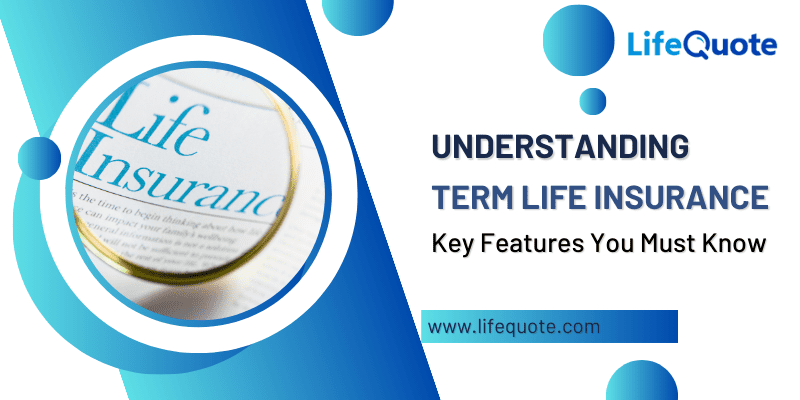Understanding Term Life Insurance: Key Features You Must Know

Hey there, savvy readers! Today, let’s delve into a topic that might not be the most thrilling but is certainly one of the most crucial aspects of financial planning: life insurance. Specifically, we’ll be shining a spotlight on term life insurance – what it is, why it’s important, and what features you absolutely need to grasp to make informed decisions about your coverage.
Life insurance is one of those things we tend to put off thinking about. After all, it’s not exactly the most exciting aspect of adulting. But trust me, understanding your life insurance options, especially term life insurance, can be a game-changer in securing your family’s financial future. So, let’s dive right in!
What Exactly is Term Life Insurance?
Term life insurance is a type of life insurance policy that provides coverage for a specific period, or term. Unlike whole life or universal life insurance, which offer coverage for your entire life, term life insurance provides coverage for a predetermined period, typically ranging from 10 to 30 years. It’s straightforward and cost-effective, making it a popular choice for many individuals and families.
Why Term Life Insurance Matters
Now, you might be wondering, “Why do I need life insurance anyway?” Well, the answer is simple: to protect your loved ones financially in the event of your untimely demise. None of us likes to think about our mortality, but ensuring that our families are taken care of when we’re no longer around is a responsibility we can’t afford to ignore.
Term life insurance offers a way to provide your family with a financial safety net during the years when they need it most. Whether it’s paying off the mortgage, covering your children’s education expenses, or replacing lost income, term life insurance can help alleviate the financial burden on your loved ones during a difficult time.
Key Features of Term Life Insurance You Must Know
Affordability: One of the biggest advantages of term life insurance is its affordability. Because it provides coverage for a specific period and does not build cash value like whole life insurance, term life premiums tend to be much lower, making it accessible to individuals and families on a budget.Fixed Premiums: With term life insurance, your premiums are fixed for the duration of the policy term. This means you won’t have to worry about your premiums increasing unexpectedly, allowing you to budget more effectively over the years.Flexibility: Term life insurance offers flexibility in terms of coverage duration and coverage amount. You can choose a policy term that aligns with your specific needs and adjust the coverage amount to ensure your loved ones are adequately protected.Renewability and Convertibility: Many term life insurance policies offer the option to renew your coverage at the end of the term, often without the need for a medical exam. Additionally, some policies allow you to convert your term policy into a permanent life insurance policy, providing you with added flexibility as your needs change over time.Death Benefit Payout: In the event of your death during the term of the policy, your beneficiaries will receive a tax-free death benefit payout. This can provide them with much-needed financial support to cover expenses such as funeral costs, outstanding debts, and ongoing living expenses.Accelerated Death Benefit Rider: Some term life insurance policies offer an accelerated death benefit rider, which allows you to access a portion of the death benefit if you are diagnosed with a terminal illness. This can help you cover medical expenses and other costs associated with your illness while you’re still alive.No Cash Value: Unlike permanent life insurance policies, term life insurance does not accumulate cash value over time. While this may seem like a drawback to some, it’s actually what helps keep term life insurance premiums affordable. Plus, the primary purpose of term life insurance is to provide financial protection for your loved ones, not to serve as an investment vehicle.
Choosing the Right Term Life Insurance Policy
When it comes to choosing a term life insurance policy, there are a few key factors to consider:
Coverage Amount: Determine how much coverage you need based on your financial obligations and long-term goals.Policy Term: Choose a policy term that aligns with your needs. Consider factors such as your age, health, and financial responsibilities when selecting the duration of coverage.Insurance Company: Research insurance companies carefully and choose one with a strong reputation for financial stability and customer service.Riders and Add-Ons: Explore any additional riders or add-ons that may be available with the policy, such as the accelerated death benefit rider or a waiver of premium rider.Premiums: Compare premiums from multiple insurance providers to ensure you’re getting the best possible rate for the coverage you need.
Final Thoughts
Term life insurance may not be the most glamorous topic, but it’s an essential aspect of financial planning that can provide invaluable peace of mind for you and your loved ones. By understanding the key features of term life insurance and choosing the right policy to meet your needs, you can ensure that your family is protected financially, no matter what life throws your way. So, don’t delay – take the first step toward securing your family’s future today!
And remember, while term life insurance is a crucial component of your financial plan, it’s just one piece of the puzzle. Be sure to consult with a financial advisor to develop a comprehensive strategy that addresses all of your financial goals and priorities. Your future self (and your loved ones) will thank you for it!




